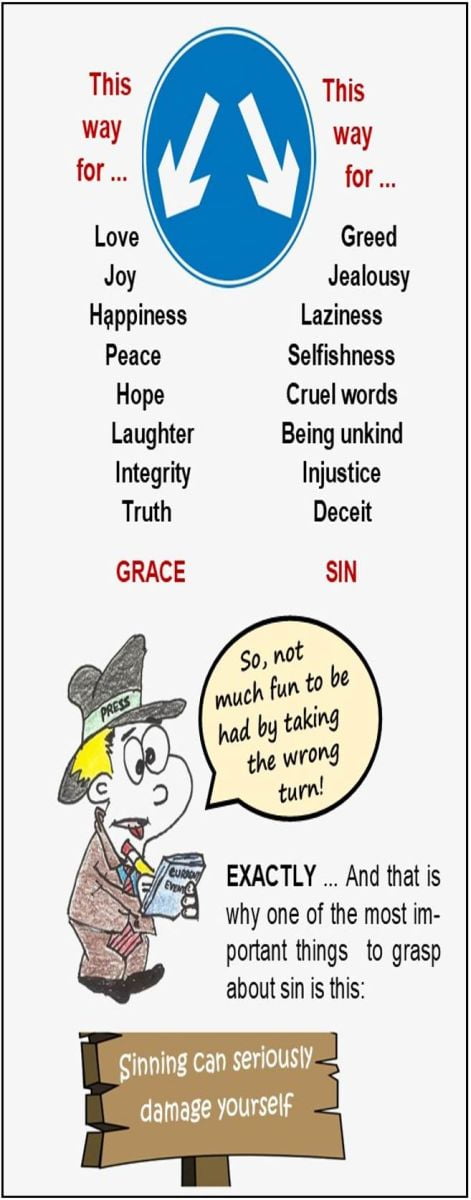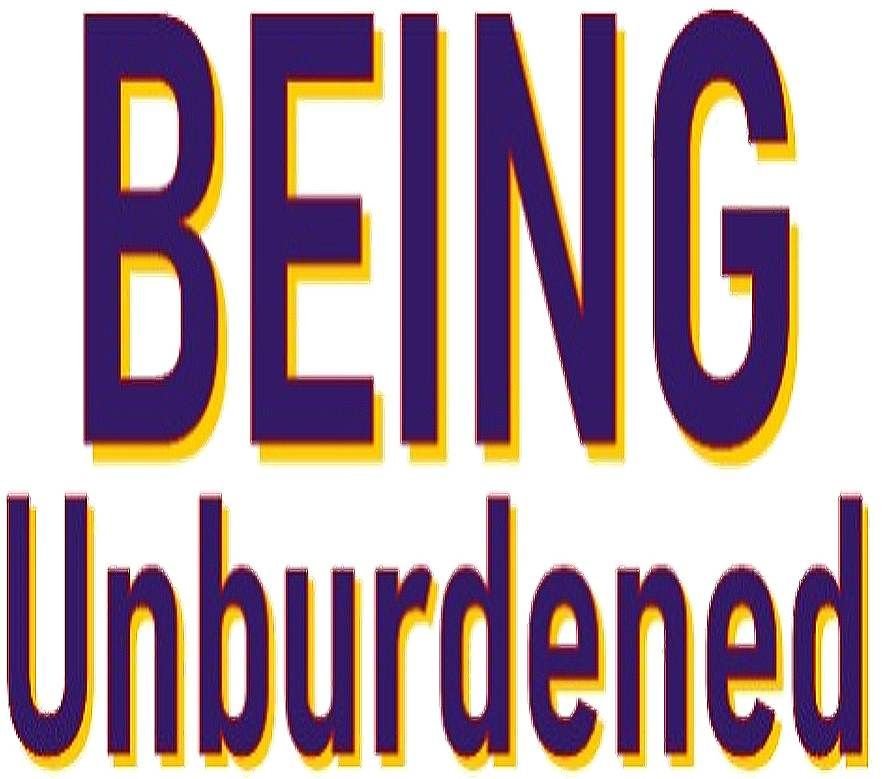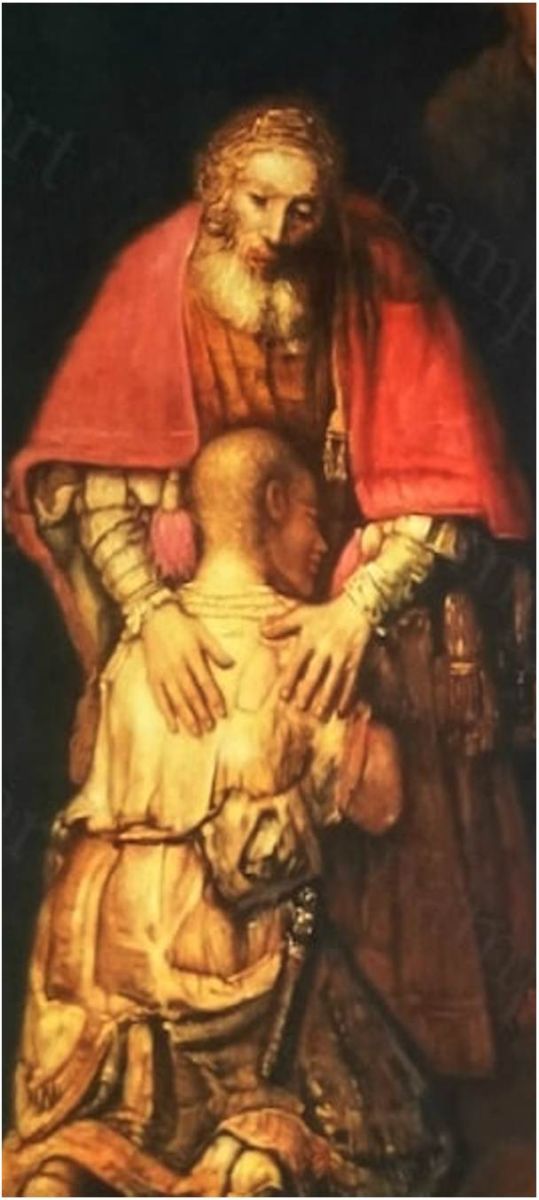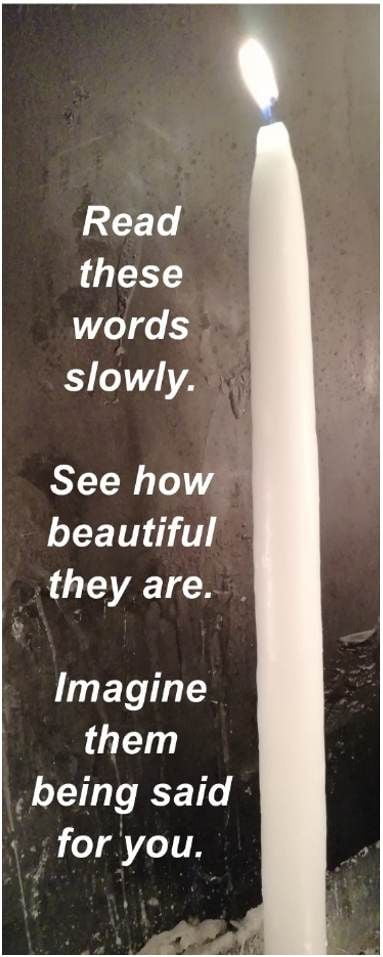Kevin Doherty, Adm., Parish of Clonmany
Welcome
With all our webpage links to the sacraments we start with the ‘why’ … for if we don’t know the ‘why’ of something … then nothing else about it will ever make sense, or touch our hearts. And, knowing the ‘why’ is probably never as urgent as the sacrament we are looking at right now, the sacrament of Reconciliation. This is because, of all the seven sacraments, possibly none is more misunderstood than this one. A helpful way to understand the ’why’ of Reconciliation is to see our life as the choice of two pathways.
 This is what we believe, as Christians, the two pathways look like. One of them leads to GOD and one leads away from GOD. The pathways have different names, Grace and Sin. The word ‘Grace’ means the life of GOD in us. And so, the word ’Sin’ means when we choose to walk away from the life of GOD in us.
This is what we believe, as Christians, the two pathways look like. One of them leads to GOD and one leads away from GOD. The pathways have different names, Grace and Sin. The word ‘Grace’ means the life of GOD in us. And so, the word ’Sin’ means when we choose to walk away from the life of GOD in us.
Which pathway looks more attractive? This is not, hopefully, a difficult question to answer! But it shows us how our choices matter.
Of all the things we believe, as Catholics, the notion of ’sin’ is possibly the one that causes the most confusion. People often think of it as ’doing something wrong, or bad’. While there is some truth in that it is not a helpful way to understand it. For ‘sin’ is not so much about a ‘thing we do’ as about the ‘life we lead’.
It’s not unusual to hear of ‘sin’ as “How much can I get away with before I stop having fun?”
This is an Absolute Disaster
In reality, ‘sin’ is about “How much have I distanced myself from who I truly am?” This is why the only one who is happy when we choose a pathway that leads away from GOD is the devil — because the devil wants to confuse us about what choices will make us truly happy and fulfilled.
And if that is true (which it is), then even out of self-interest, it would seem very useful to know how, if our spiritual life has gone down a cul-de-sac — a dead end, literally — what we can do.


Encountering the LORD
in the Sacrament of Reconciliation
Encountering Jesus in the sacrament of Reconciliation should never feel like a burden. Indeed Jesus invites us (or, really, begs us) to come to him in the sacrament. This is why Jesus calls the sacrament of Reconciliation ’the Priceless Treasure’. It shows us that even though we may walk away from GOD, many times, GOD never walks away from us. He is always inviting us to come back, and to get ourselves ready for eternal life again.
We do this in the sacrament of Reconciliation. Which makes us wonder: Why do so many Catholics in Ireland stay away from the gift of Reconciliation? There are many reasons (including a world that denies ’sin’ even exists). But, when the reason is that, as Church, we have made it so unattractive … then we must profoundly apologise, and do better.
WHAT TO DO AT CONFESSION
When you come into the reconciliation room you can choose (normally) to kneel behind a screen (where the priest can hear you but not see you), or to sit in a chair facing the priest. The priest will welcome you warmly. Remember we are all sinners, and all searching for the love and peace and joy of the Lord.
- When ready we make the Sign of the Cross.
- You say “Bless me, Father, for I have sinned. It has been (state how long) since my last confession. These are my sins.”
- The priest will the invite you and help you (if needed) to tell your sins simply and honestly. Remember we are saying them to Jesus, not to the priest (we believe that Jesus acts through the priest). Also, it is not a memory test so please do not be under pressure trying to remember everything (although some people find it useful to write things down beforehand). This is your time so feel free to say what you can and, if you need to, tell why you did what you did. The priest will help in any way you need.
- When you have said what you want to say, the priest may have some advice that might help. You may have questions. This is more like a chat in the company of Jesus, who loves us, and whose love is everything.
- One of the most beautiful words we say, and yet one of the hardest, is ‘Sorry’. We say this now to Jesus. But we do not say it because we have to … we say it because we want We know that our sins are not truly who we are, and so we are sorry that we have acted in a way that is not worthy of us, and not from GOD.
In Confession (Reconciliation) we have a special prayer for saying ’sorry’. We call it the Act of Contrition, or the Act of Sorrow. A common one in Ireland is this version:
O my GOD,
I thank you for loving me. I am sorry for all my sins,
For not loving others and not loving you.
Help me to live like Jesus, and not sin again. Amen.
The priest then says the prayer of Absolution, or Forgiveness
GOD the Father of mercies,
through the death and resurrection of his Son
has reconciled the world to himself
and sent the Holy Spirit among us
for the forgiveness of sins;
through the ministry of the Church
may GOD give you pardon and peace,
and I absolve you from your sins
in the name of the Father,
and of the Son
and of the Holy Spirit. Amen.
The sacrament of Reconciliation available upon request in our parish, or at specific times such as Easter. Christmas, and some Saturday mornings.
